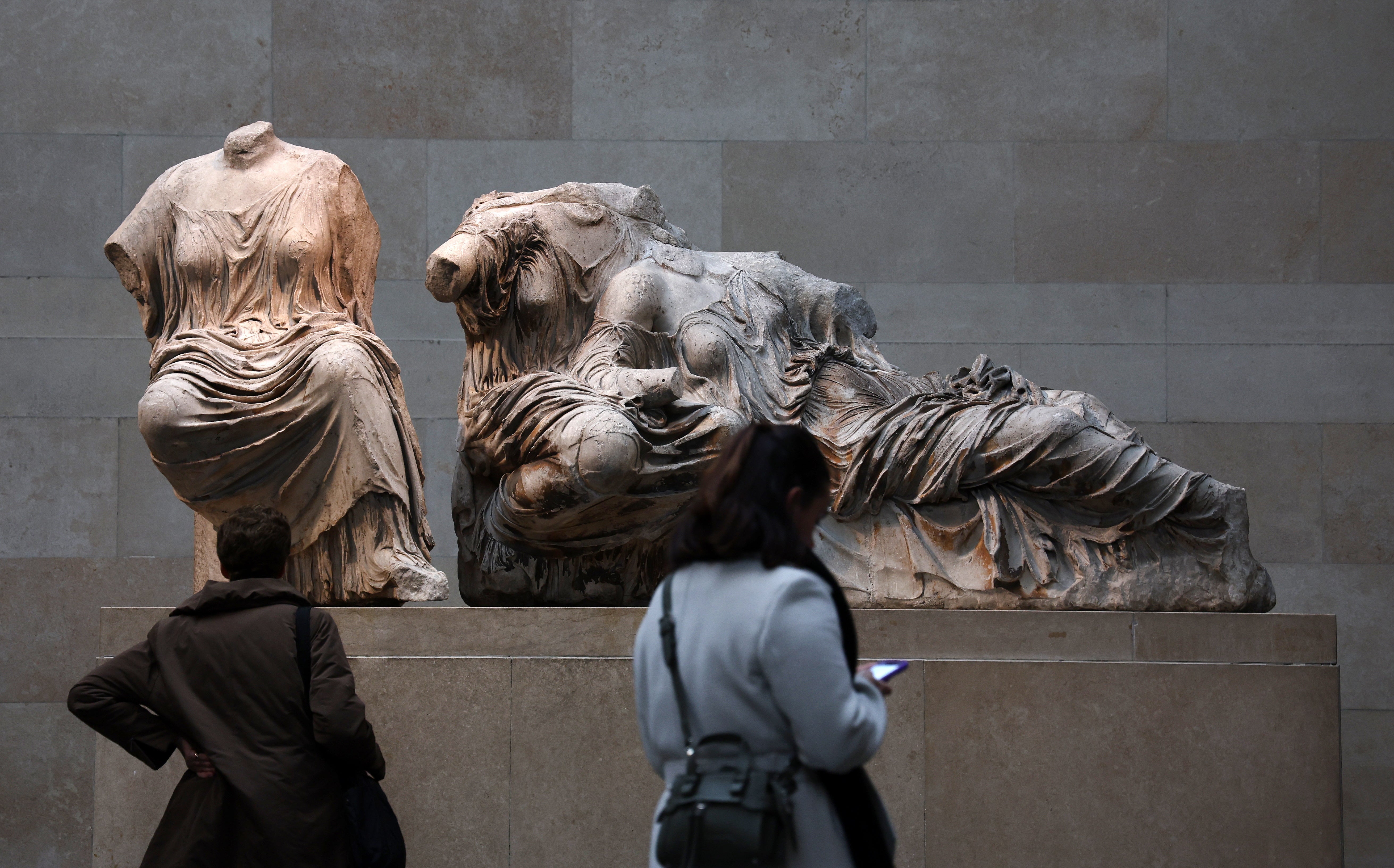What is the politics behind the Elgin marbles controversy?
Even loaning out the Parthenon sculptures would be controversial – and mean potentially returning a whole host of other looted artefacts stuffed in museums and stately homes, as Sean O’Grady explains


Relations between Britain and Greece are strained once again over the Elgin marbles – or Parthenon marbles, as they are more officially known. Rishi Sunak was so annoyed by his Greek counterpart, Kyriakos Mitsotakis, talking aloud about their return to Athens that he cancelled their meeting planned for Tuesday – a highly unusual snub. The prime minister resented the issue gaining a higher profile, with the risk he would be left looking weak in the face of a foreign threat (absurd as that might sound).
Ownership has been a touchy subject for some decades; they are an ironic totem of British sovereignty given that relatively few Britons know what or where they are. In some circles, mention of them can provoke a paroxysm of post-imperial pride and tenacity. Like many other such national “possessions”, they have become political symbols and thus virtually immune from rational debate. Indeed, such is the current taste for “culture wars” that they are more bitterly contested than ever.
Are we going to give the Parthenon marbles back?
No. There is far too much national pride associated with these artefacts, and even a prime minister in a far stronger position than Mr Sunak would find it difficult to survive the backlash. For the same reason, Labour has made no such promises, though it has to be said that Sir Keir Starmer handled his meeting with Mr Mitsotakis more deftly. (The fact that Mr Mitsotakis met the leader of the Opposition first might have further irritated Mr Sunak).
British officials argue that repatriating the sculptures would set an unfortunate precedent, meaning all the other nicked gear would soon have to be crated up and sent overseas. It’s a position that begs a few moral questions.
Legally, it’s a matter for the government not the British Museum, because the British Museum Act 1963 ensures a majority of its trustees are appointed by ministers. One unfortunate consequence of this desire not to set a precedent was that paintings looted by the Nazis in 1939 from their Jewish owner, Dr Arthur Feldman, later acquired by the museum, were not given back to his family.
Is there a compromise?
The museum’s director, George Osborne, has proposed some sort of a loan as part of a mutual swap of treasures with Greek institutions. For political reasons it will not happen, at least before a change of government. A Labour landslide might just embolden Sir Keir to repair relations, but it won’t be a priority.
What are the politics of this?
Very difficult, domestically. Any politician from any strand of opinion who suggests even debating the status of these artefacts risks the charge that they are unpatriotic, “hate Britain”, or even are treasonous. Would post-imperial, post-Brexit Britain win some valuable friends – and lucrative trade deals – across the world if it could find itself capable of returning what are basically stolen goods? That goes for colonial possessions as well as the many chattels stuffed in other museums or stately homes, some not even on display.
In the case of Greece, there are cases to be made over migration and trafficking; the status of Cyprus and the future of the UK base there. And for the enhancement of relationships within Nato, especially with Turkey, and with Ukraine, China and the Middle East.
What else is in dispute?
For Britain and other former imperial powers, an enormous amount. Such precious cultural artefacts, essentially looted during the age of empire, include the Benin Bronzes (claimed by Nigeria); the Koh-i-Noor diamond (India, Afghanistan and Pakistan all wanting that bauble); the Rosetta Stone (Egypt); Maori shrunken heads (New Zealand) and the Maqdala Manuscripts (Ethiopia).
Does the same go for what’s left of the British empire?
Mostly. This month’s surprise election of super-nationalist Javier Milei has resurfaced Argentina’s claim to the Falkland Islands, a territory whose people are proudly British but whose possession by Britain is possibly even harder to justify now than it was in 1982 when both countries went to war over the territory. Gibraltar, to which Spain has a viable claim, is in much the same category. A vague plan hatched by Tony Blair to find a new constitutional basis for “the Rock” and normalise Spanish relations ran into furious opposition back in the 2000s. So, too, is the British Indian Ocean Territory, which Mauritius wants back; largely evacuated and uninhabited, it nonetheless houses an important US airbase.
In all of these examples, a long-term sustainable post-colonial settlement, free from the threat of invasion or legal wrangling, is made far more difficult by a domestic political climate that puts a premium on obduracy. Exiting the EU has also complicated matters.
Have we ever given anything back?
Apart from most of the British empire, reluctantly “given back” after the Second World War, very little. Earlier this year, the National Museum of Scotland in Edinburgh returned an 11m totem pole that had been stolen from the Nisga’a people of Canada in 1929. They were off hunting and fishing when an agent of the museum, Marius Barbeau, and his crew chopped it down and took it across the Atlantic. This time round, the totem pole has not been missed to anything like the same extent by the Scots.






Join our commenting forum
Join thought-provoking conversations, follow other Independent readers and see their replies
Comments